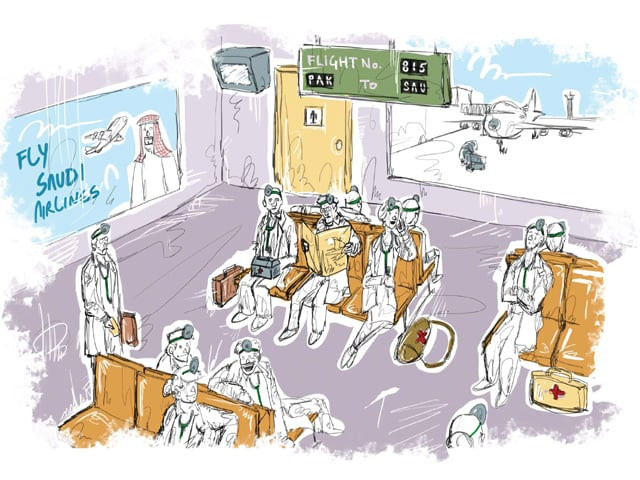Who knew there would be greener pastures in the desert?
Jobs in Saudi Arabia attract many Pakistani doctors who wish to lead better lives.

Working as an internal medicine specialist at Civil hospital for Rs35,000, she believes that the job in Saudi Arabia is a far better opportunity. As she does not have to resign from her job here and can instead take a three-year leave from the hospital, she plans to come back to Pakistan if she is unable to settle down in Saudi Arabia.
“Life is so difficult in Pakistan and my kids will get a better future there,” she said with reference to the security risks she sees in Karachi.
Samar is one of the many doctors who were interviewed by the Saudi government’s health ministry in October after the government announced job openings for medical practitioners the previous month. Although around 700 doctors were recruited by the Saudis over the summer, they are now looking for more candidates.
The interviews were conducted in Karachi, Lahore and Islamabad, after which the Saudi government proceeded to shortlist Pakistani consultants and specialists in more than 22 medical fields. They also offered jobs to staff technicians and nurses.
The Saudis are recruiting people with the help of the Pakistani government as well as three private recruitment agencies — Al Khair, Al Qureshi and the Fauji Foundation. An official from the ministry of labour and manpower told The Express Tribune that while they were not given a specific number of people the Saudi government was interested in hiring, there were still many vacancies left.
Pakistan Medical Association president elect Dr Tipu Sultan said that the Middle East is interesting in hiring doctors from Pakistan as well as other “culture-friendly” countries such as India and Bangladesh because the doctors from the US, UK and Canada are getting paid more in their own countries. Moreover, the doctors from the West are scared to apply to countries where al Qaeda and other militant groups pose a threat to their safety, Sultan added.
Meanwhile, Sultan termed the movement of doctors from Pakistan to Saudi Arabia both good and bad. “It is good in the sense that doctors now have the means to escape the disorderly conditions they are facing due to ineffective government policies. But it is bad because it is leading to brain drain. Unfortunately, most of these doctors don’t come back, which means that our trained professional labour force is decreasing,” he said.
Moreover, when a doctor takes a leave of absence from a government hospital, the latter is forced to keep a slot open for the doctor, which means that the hospital must operate efficiently with a smaller work force, he added.
“The situation has become very grave because there is now a dearth of doctors in the country,” said Pakistan Medical and Dental Council (PMDC) member Professor Shershah Syed. He said that the killing of doctors is one of the main reasons why they wish to get out of the country. “It’s not the money, it’s the security that pulls them away,” he said. “Even if their salaries are lower in Pakistan, doctors won’t leave if they felt safe. I know many doctors who are leaving only because they feel threatened in Karachi.”
Dr Asim Aziz, who runs a private clinic in Karachi, is one such doctor. While he could not secure a job for himself in Saudi Arabia, his wife, who is also a doctor, was offered one, which is why the family decided to move. While Aziz knows that he will not be able to continue his personal practice abroad without a licence, he believes that the move is a better option than practising here as he will have “life security there”.
Published in The Express Tribune, November 3rd, 2010.



















COMMENTS
Comments are moderated and generally will be posted if they are on-topic and not abusive.
For more information, please see our Comments FAQ